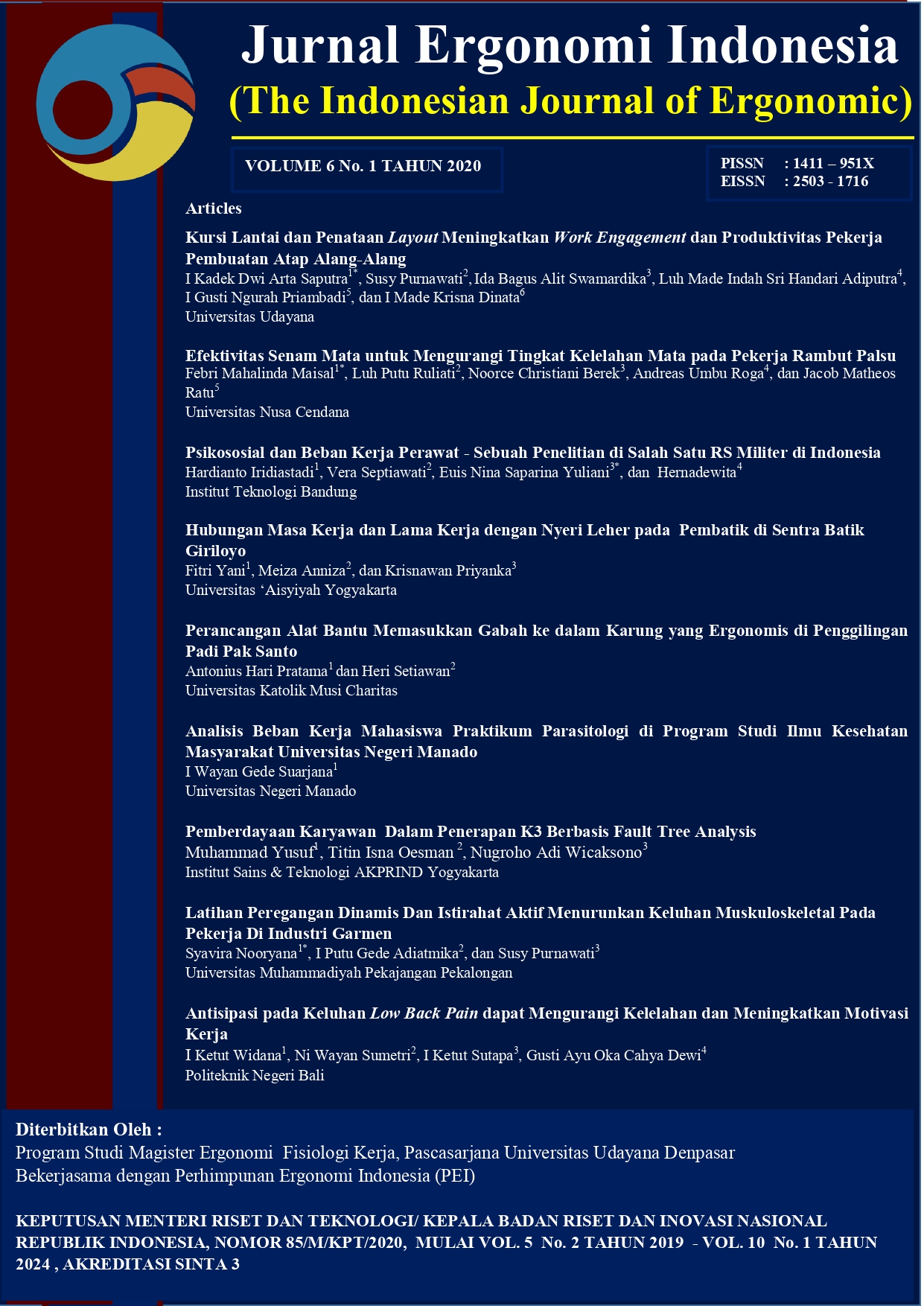Psikososial dan Beban Kerja Perawat – Sebuah Penelitian di Salah Satu RS Militer di Indonesia
Abstract
This study aimed to determine the level of mental workload and psychosocial factors of nurses at the executive level in in-patient rooms of a military hospital. Data were collected by distributing questionnaires to 41 nurses who served in the in-patient rooms. Measurement of mental workload was carried out using the National Aeronautics and Space Administration - Task-Load Index (Nasa-TLX) questionnaire. Measurement of psychosocial factors was carried out using the Copenhagen Psychosocial Questionnaire (COPSOQ II) questionnaire. The results showed that the average value of the overall mental workload was in the high category. The value of psychosocial factors in the work environment shows good results on the majority of the rating scales. However, the hospital needed to pay attention to several factors, such as emotional demands, health perceptions, fatigue and stress and work pace. The results of this study also showed a strong and significant positive relationship between the dimensions of management's trust and performance with r=0.545(p=0.000). Thus, it is recommended that hospital management not only assess the performance of nurses, but also periodically assess mental workload and psychosocial factors in order to create a conducive work environment
Downloads
References
Aiken, L. H., Clarke, S. P., Sloane, D. M., Sochalski, J. A., Busse, R., Clarke, H., Giovannetti, P., Hunt, J., Rafferty, A.M., dan Shamian, J. 2001. Nurses’ Reports On Hospital Care In Five Countries. Health Affairs, Vol. 20(3):43-53.
Carayon, P., dan Alvarado, C. J. 2007. Workload and Patient Safety Among Critical Care Nurses. Critical Care Nursing Clinic of North America, Vol. 19:121–129.
Carayon, P., dan Gurses, A. 2005 . A Human Factors Engineering Conceptual Framework Of Nursing Workload And Patient Safety In Intensive Care Units. Intensive and Critical Care Nursing, Vol. 21:284-301.
Chang, H. E., dan Cho, S.H. 2016. Workplace Violence and Job Outcomes of Newly Licensed Nurses. Asian Nursing Research, Vol. 10:271-276.
Duffield, C., Roche, M., dan Merrick, E. T. 2006. Methods Of Measuring Nursing Workload In Australia. Collegian, Vol. 3(1):16-22.
Flo, E., P. S., Mageroy, N., Moen, B. E., Gronli, J., Nordhus, I. H., dan Bjorvatn, B. 2012. Shift Work Disorder in Nurses – Assessment, Prevalence and Related Health Problems. PLoS ONE, Vol. 7(4):e33981.
Hart, S. G. 2006. Nasa-Task Load Index (Nasa-TLX). 20 Years later.
Heller, G. Z., Manuguerra, M., dan Chow, R. 2016. How to Analyze the Visual Analog Scale : Myths, Truths and Clinical Relevance. Scandinavian Journal of Pain, Vol. 13:67-75.
Ilic, I. M., Arandjelovic, M. Z., Jovanovic, J. M., dan Nesic, M. M. 2017. Relationship of Work - Related Psychosocial Risks, Stress, Individual Factors and Burnout - Questionnaire Survey Among Emergency Physicians and Nurses. Medycyna Pracy, Vol. 68(2):167-178.
ILO. 1986. Psychosocial Factors At Work : Recognition and control. Geneva: International Labour Office.
Indriawan, R., dan Yaniawati, P. 2016. Metodologi Penelitian. Bandung: Refika Aditama.
Kementrian Kesehatan RI. 2017. InfoDATIN Pusat Data dan Informasi Kementrian Kesehatan RI. pp. 1-10.
Kristensen, Hannerz, Hogh, dan Borg. 2005. The Copenhagen Psychosocial Questionnaire - A Tool for The Assessment And Improvement of The Psychosocial Work Environment. Scandinavian Journal of Work, Environment dan Health, Vol. 31(6):438–449.
Mazur, L.M., Mosaly, P.R., Jackson, M., Chang, S. X., Burkhardt, K.D., Adams, R.D., dan Marks, L.B. 2012. Quantitative Assessment of Workload and Stressors in Clinical Radioation Oncology. International Journal of Radiation Oncology Biology Physics, Vol. 83(5):e571-e576.
Pejtersen, J.H., Kristensen, T.S., Borg, V., dan Bjorner, J.B. 2010. The Second Version of The Copenhagen Psychosocial Questionnaire. Scandinavian Journal of Public Health, Vol. 38:8-24.
Potter, P., Wolf, L., Boxerman, S., Grayson, D., Sledge, J., Dunagan, C., dan Evanoff, B. 2005. Understanding the Cognitive Work of Nursing in the Acute Care Environment. Journal of Nursing Admisnistration, Vol. 35(7/8):327-335.
Rahman, H. A., Abdul-Mumin, K., Naing, L. 2017. Psychosocial Work Stressor, work Fatigue, and Musculoskeletal Disorders : Comparison between Emergency and Critical Care Nurses in Brunei Public Hospitals. Asian Nursing Research, Vol. 11:13-18.
Roud, D., Giddings, S., dan Koziol-McLain, J. 2005. A longitudinal survey of nurses' selfreported performance during an entry to practice programme. Nurs Praxis N Z. Inc, Vol. 21(2):37-46.
Sekaran, U., dan Bougie, R. (2013). Research Methods for Business. United Kingdom: Wiley.
Schuetz, M., Gockel, I., Beardi, J., Hakman, P., Dunschede, F., Moenk, S., dan Junginger. 2008. Three Different Types of Surgeon-Specific Stress Reactions Identified by Laparoscopic Simulation in A Virtual Scenario. Surgical Endoscopy, Vol. 22:1263–1267.
Tanaka, N., Ohno, Y., Hori, M., Utada, M., Ito, K., Suzuki, T., dan Furukawa, F. 2015. Predicting Preoperative Hemodynamic Changes Using the Visual Analog Scale. Journal of PeriAnesthesia Nursing, Vol. 30(6):460-467.
Tucker, A.L., dan Spear, S.J. 2006. Operational Failures and Interruptions in Hospital Nursing. Health Services Research, Vol. 41(3):643-662.
Wazqar, D.Y., Kerr, M., Regan, S., dan Orchard, C. 2017. An Integrative Review of The Influence of Job Strain and Coping on Nurse's Work Performance ; Understanding The Gaps in Oncology Nursing Research. International Journal of Nursing Sciences, Vol. 4:418-429.
Werdani, Y.D. 2016. Pengaruh Beban Kerja Mental Perawat Terhadap Tingkat Kepuasan Pasien Di Ruang Rawat Inap Rumah Sakit Swasta Di Surabaya. Ners LENTERA, Vol. 4(2):97 - 105.

















